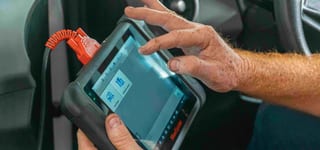The importance of car diagnostics

Cars nowadays are sophisticated machines, packed with electronics and complex systems. When something goes wrong, pinpointing the exact issue can be challenging. Fortunately, there's a solution: car diagnostics. This process utilizes advanced technologies to check a vehicle's health and identify any problems. In this article, we delve into what car diagnostics entail, why it's crucial, and how it works.
What is car diagnostics?
Car diagnostics is a process that employs advanced equipment to monitor a vehicle's performance and detect any issues. These systems utilize sensors and software to analyze various aspects of the car, such as engine performance, fuel efficiency, emission levels, and more. By collecting and analyzing this data, a mechanic can swiftly and accurately determine what's wrong with a car.
Benefits of car diagnostics
Speed
Car diagnostics can swiftly identify issues, resulting in faster repairs and less downtime for the vehicle.
Accuracy
Utilizing advanced technologies, car diagnostics can pinpoint problems more accurately than traditional methods.
Cost savings
By identifying issues promptly, repairs can often be conducted before they worsen, saving costs in the long run.
How does car diagnostics work?
Car diagnostics employ various methods and technologies to identify vehicle issues. One of the most common methods is utilizing an onboard diagnostics (OBD) system. This system utilizes sensors built into the car to gather data about various aspects of the vehicle's performance. This data is then analyzed by the car's onboard computer, which identifies any problems and generates a fault code indicating the issue.
Other methods of car diagnostics
- Diagnostic Scanners: These portable devices are connected to the car's OBD port and can quickly and easily read fault codes.
- Software Programs: Several software programs are available to monitor a vehicle's performance and detect issues.
- Visual Inspection: Sometimes, issues with a vehicle can be identified by conducting a visual inspection, such as checking tire condition, fluid levels, and more.
Why is car diagnostics important?
Car diagnostics are vital for the maintenance and repair of modern vehicles. Here are some reasons why:
Enhanced reliability
Car diagnostics can identify potential issues before they escalate, improving the vehicle's reliability and preventing unexpected breakdowns.
Cost savings
By identifying issues early, repairs can often be conducted before they worsen, saving costs in the long term.
Environmental friendliness
Car diagnostics can help reduce emissions of harmful pollutants by ensuring the engine operates efficiently and emission control systems function properly.
How can you use car diagnostics?
As a car owner, you can benefit from car diagnostics by performing regular maintenance and not ignoring suspicious symptoms. Here are some tips for effectively using car diagnostics:
Regular maintenance
Schedule regular maintenance for your vehicle, including a thorough check of all major systems.
Be alert to symptoms
Watch out for signs of potential issues, such as strange noises, vibrations, decreased performance, or dashboard warning lights.
Utilize car diagnostic tools
Invest in a diagnostic scanner or software program that allows you to monitor your vehicle's health independently.
Conclusion
Car diagnostics are an essential part of maintaining and repairing modern vehicles. By utilizing advanced technologies, mechanics can swiftly and accurately identify problems, resulting in more efficient repairs and long-term cost savings. As a car owner, it's important to perform regular maintenance and address any suspicious symptoms promptly to ensure your vehicle operates at its best. With car diagnostics, we can make our vehicles more efficient and reliable, resulting in a better driving experience for everyone.
